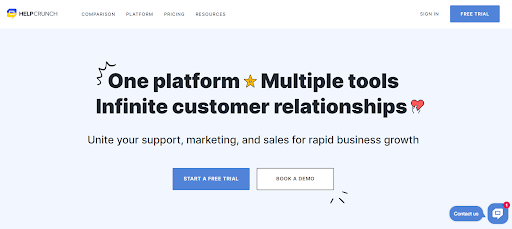
Are your support agents always bombarded with repetitive customer requests that leave them with little to no energy for issues that really matter?
That’s the sad story of every growing business receiving more tickets than what their teams can handle.
What if we told you there is a simple solution to this common problem?
Deploying the right FAQ software can help you create a dedicated FAQ section and place it prominently on your website so that it gets the attention it deserves.
Well-written FAQs take care of all basic customer issues, reducing ticket volume and allowing agents to utilize their energies toward more pressing problems.
But, here’s a question – as the market is brimming with hundreds of FAQ tools offering almost similar features, how do you choose the ONE software that matches your expectations?
This blog lists down the top 10 FAQ software, along with their features, pros and cons, and pricing. But before that, let’s learn some basics of FAQ tools.
Let’s go!
What is FAQ Software?
FAQ software is a tool that helps you write and publish online FAQs for your customers. Using this software, you can create well-structured FAQs with relevant interlinking. With a powerful search system, customers can quickly find answers to any questions they have and solve issues independently.
The best FAQ tools possess the capability to structure FAQs logically, add images and videos to answers, and place FAQs at the most opportune spot on your website. They help you build online FAQs that are accessible across devices, especially mobile phones, for 24×7 self-service support.
Astounding Benefits of FAQ Software
If rising support tickets is a major concern for your business, FAQ software can provide the solution you need. Creating an FAQ library promotes 24×7 self-service, which means reduced tickets, productive agents, and, most importantly, happier customers.
Let’s uncover the key benefits the best online FAQ software bring to the table.
Reduce Customer Support Tickets
According to research by Bare International, self-service adoption is the need of the hour.

With a self-service resource like online FAQs, problem-solving becomes a matter of a few clicks. As customers become independent problem solvers, they don’t feel the need to contact your support team for basic issues. This gradually brings down your ticket volume, relieving agents from answering the same questions day after day. Agents now have more time on their hands to take up serious matters and focus on strategic work.
2. Make Your Support Process More Efficient
An FAQ portal is a handy resource not just for customers but for agents too. Agents can use online FAQs as a reference guide to address customer concerns raised across calls, emails, or as tickets. The time that is otherwise wasted in scrambling for information across emails and Google Drive is now saved. This means prompt responses and quality services with minimum wait time.
Boost Your Online Traffic & Ranking
Google loves FAQs. That’s because FAQs are easy to scrawl and provide quick answers to specific questions. With the right FAQ software, you can create comprehensive FAQs and optimize them for search engines using appropriate keywords, meta tags, and meta descriptions. Well-optimized FAQs have a higher chance of grabbing a spot in the SERP, which positively impacts your website’s traffic and ranking.
Reduce Customer Service Cost
By empowering customers to solve problems on their own using your online FAQs, your ticket volume decreases substantially. As ticket inflow reduces, agents have to deal with fewer customers. Your support function runs smoothly even with fewer agents, which cuts down the overall customer service cost.
When Is It Ideal to Deploy FAQs on Your Website?
Creating FAQs is a good strategy to adopt if a majority of your support tickets are on basic issues that should ideally be managed at the customers’ end. Answering simple questions one after the other not only brings monotony to agents’ work but also deprives them of the time to focus on serious customer issues that are way more important.
If you are facing a similar situation, an FAQ page can be a huge help. It provides immediate answers to simple, frequently asked questions, thus preventing customers from raising tickets for minor problems.
What are the Key Elements of an FAQ Page Template?
While the leading web FAQ software offer ready-made templates to create FAQs, only a few of these are actually helpful. So what differentiates an average template from an excellent one?
There are some key elements that every FAQ page template should have. Let’s have a look at them.
Home Page:
It’s great to have a home page giving a glimpse into the contents of the FAQs. The FAQ page title at the top, along with the headers of all the sections covered, will give customers a bird’s eye view of what’s in store for them.
Branding:
This is a crucial element that is often overlooked when creating FAQs. How your FAQ page looks and feels speaks volumes about your brand. The FAQ page template should be well-aligned with your company’s branding. It should have the right colors, fonts, and themes that blend well with your brand.
Table of Contents:
The FAQ template should comprise a table of contents covering all broad topics and their sub-categories. This will help customers navigate to the desired section in just a few clicks.
How to Build an Impressive FAQ Section for Your Website
Here’s a short video that explains everything you need to know about creating online FAQs
Creating FAQs is simple if you know the right steps that go into the process.
Deploying FAQ builder software and thinking that it will solve all your problems is just like building castles in the air. Building a rich, insightful FAQ database requires much more than just using the right tool.
For FAQs to be really helpful to prospects and customers, every question needs to be carefully researched, written, and structured. You need to be in continuous touch with the sales and support team to identify the common challenges customers face.
Consider every pain point as critical information that can be converted into meaningful questions and answers. FAQs also need to be well-structured and enriched with powerful visuals to leave a lasting impact on readers.
Like this, there are several crucial steps involved in the process that help shape FAQs into a full-fledged problem-solving platform.
10 Best FAQ Software for Customer Support
Your search for the best FAQ software ends here. After scouring several websites and review platforms, we have compiled a list of the top tools to help you make a sound decision.
ProProfs Knowledge Base

ProProfs Knowledge Base is an easy-to-use FAQ tool packed with extraordinary features for content authoring, designing, and publishing. Its user-friendly interface and code-free functionality promise a short learning curve. You can get started in minutes using pre-designed templates and customize the FAQs with your favorite fonts, colors, and themes.
Another fascinating feature of the tool is its integration with sibling software – ProProfs Chat and Help Desk. The trinity of these powerful tools enables you to provide customers with a 360° support experience in the form of self-service, live chat, and ticketing – all from one single platform.
Key Features:
- Write, edit, and publish content easily with MS Word-like editor
- Save time in designing and formatting by using pre-designed FAQ templates
- Monitor KPIs and boost FAQ performance using built-in reports
- Set workflows to review FAQs before going live
- Let teams create FAQs collectively by assigning roles and permissions
Pricing: Starts from $49/author/month
HelpScout

Built for growing businesses, HelpScout is a simple yet powerful customer support software. Its Docs tool is easy to use and comes as a part of its customer support suite. With a robust WYSIWYG editor, Docs makes creating and publishing FAQs easy and quick.
Moreover, Docs complements well with HelpScout’s help desk system. This means every time agents respond to a ticket, they can add a relevant FAQ link as part of the reply, thus enhancing the overall support experience.
Key Features:
- Offer complete support solutions including knowledge base, live chat, and help desk tools
- Provide end-to-end customer support with several third party integrations
- Monitor and improve FAQ performance with comprehensive reporting
- Pack your FAQs in a beacon help widget for easy access
- Optimize FAQs for search engines with auto-generated sitemap and SEO options
Pros & Cons:
Pros:
1. Embed FAQ page on your website as a popover, sidebar, modal, or beacon
2. Build and maintain multiple FAQ pages using a single log in
Cons:
1. HelpScout’s Docs come as a part of the customer support suite. You will have to subscribe to the whole software, even if you only need the Docs tool.
2. The basic plan at $20 a month offers only 1 Docs site making it a costly tool for companies that are on a budget
Pricing: Starts from $20/user/month
Slab

Slab is a popular FAQ knowledge base software with an intuitive interface and modern editing features. Designed for both non-technical and tech-savvy users, this tool helps you create content without worrying about formatting as it’s already taken care of.
The unified search makes it possible for customers to extract information from Slab as well as other integrated tools. Slab works well with the stack of tools you might already be using, such as spreadsheets, flowcharts, slide decks, and many others.
Key Features:
- Organize content systematically in posts and topics
- Gain useful insights into popular articles and top contributors
- Keep a close eye on content accuracy with post verification
- Let teams write and edit content together in real-time
- View and restore previous versions of your FAQs
Pros & Cons:
Pros:
1. Run a unified search across Slab and other integrated tools
2. User-friendly interface and easy navigation
Cons:
1. Key features like custom domain and premium integrations are not included in the Standard plan
2. Doesn’t provide custom fonts and colors for customization
Pricing: Starts from $6.67/user/month
SupportBee

SupportBee is primarily a ticketing tool that helps support teams manage and resolve customer issues. The tool also offers knowledge base software that helps you create online FAQs and help sites for customer self-service.
With a bunch of bespoke features, such as a rich text editor, super-fast search system, and custom domain, SupportBee has all the essential qualities of an ideal FAQ tool. You can also manage FAQs of different sites under a single login, which is both time and cost-saving.
Key Features:
- Embed FAQs on your company’s website or mobile application for easy access
- Set up a unique domain name for your FAQ site
- Easily upload images, videos, PDFs, and ebooks to FAQs
- Make information discovery easy with robust search functionality
- Brand FAQs with your company’s logo, colors, and fonts
Pros & Cons:
Pros:
1. Add FAQ links to ticket responses
2. Lightweight interface and awesome customizations
Cons:
1. You can create only one help site in its startup plan and 3 sites in the enterprise plan
2. Only basic integrations provided in the startup plan
Pricing: Starts from $13/user/month
5. Zendesk

Any top FAQ software list is incomplete without the mention of Zendesk. As one of the most popular customer support tools, Zendesk offers the best of both worlds – self-service and ticketing. Zendesk’s self-service software, popularly known as, Zendesk Guide, offers stunning templates to help you get started on the right foot. Furthermore, the software’s customizable themes, multilingual support, and team publishing features make the entire process of creating online FAQs hassle-free.
Key Features:
- Share AI-powered article recommendations inside ticket responses
- Localize your FAQ content in 40+ languages
- Use AI-powered content cues to find your top and poor-performing FAQs
- Involve the right people in the FAQ creation process with Team Publishing
- Update content across articles and save time using Content Blocks
Pros & Cons:
Pros:
1. Provide seamless self-service with built-in answer bots
2. Assign articles to writers and view the status as work progresses using Team Publishing
Cons:
1. You can create one help center in Zendesk’s basic plan
2. If you want a standalone FAQ tool without the additional functionality of live chat and help desk, Zendesk might not be the right fit.
Pricing: Starts from $49/agent/month
6. Wix Answers

With flexibility and efficiency at its core, Wix Answers makes it easy to create FAQs for your website. Its knowledge management solution is 100% customizable and offers contextual help widgets, built-in SEO, and customer feedback options.
Using the Wix FAQ app, you can build beautiful FAQs that look great on the web as well as on mobile devices. An interesting element of this FAQ tool is that it lets you add social media buttons, helping you share FAQs with others and drive traffic to your website.
Key Features:
- Create customized FAQs that match your company’s branding
- Let customers translate FAQs in their native language
- Manage, review, and update FAQs from one centralized dashboard
- Add images, videos, GIFs, and emojis to increase engagement
- Optimize your FAQs for search engines and mobile phones
Pros & Cons:
Pros:
1. Share FAQs instantly on Twitter, Facebook, or LinkedIn
2. Gain valuable insights into overall self-service success using built-in analytics
Cons:
1. Lacks enterprise features
2. Wix is a comparatively new tool that is still evolving
Pricing: Starts from $24/agent/month
7. Stonly

Stonly is an interactive knowledge base software that helps you provide personalized guidance to customers through well-written FAQs. You can customize your FAQs to your liking and get in-depth insights into how customers are using your content, the paths they follow, and how many of them bounce off.
Stonly includes a robust search function to help customers find all that they need in a heartbeat. The modular design and robust versioning of this FAQ system make it easy for you to update the FAQs as customer needs change.
Key Features:
- Track FAQ versions and keep a close eye on all changes made
- Use custom CSS to give FAQs the desired look and feel
- Gain useful insights into FAQ performance using advanced analytics
- Add images and videos to content to improve customer engagement
- Update FAQs quickly to maintain their relevance and accuracy
Pros & Cons:
Pros:
1. Choose from a library of ready-made templates and get started in minutes
2. Intuitive and modern design
Cons:
1. Needs developer assistance
2. Limited customization options
Pricing: Starts from $99/month
8. Zoho Desk

Zoho Desk is an omnichannel customer support software that offers an all-in-one solution, including help desk, online forms, and knowledge base tools. Its knowledge base solution is ideal for creating FAQs and embedding them right inside your website or mobile app.
You can integrate communities and forums in FAQs, where customers can discuss challenges and get solutions from fellow users. Zoho Desk also offers customization, domain mapping, and SEO capabilities.
Key Features:
- Add meta titles, descriptions, and keywords for SEO-friendly FAQs
- Allow public access or keep the access private to specific users
- Customize the FAQs to your heart’s content with CSS and HTML
- Analyze FAQ usage and engagement with built-in reports
- Let customers submit tickets right from within the FAQs
Pros & Cons:
Pros:
1. Use KB Bot to instantly share relevant answers with customers and save them from browsing all FAQ pages
2. Provides a free plan with limited but key features like a help center, mobile app, email ticketing, etc.
Cons:
1. Integration with other Zoho modules could be improved
2. Customer support is disappointing at times with continuous back and forth.
Pricing: Starts from $10/agent/month
9. Helpjuice

Helpjuice is an easy-to-use and fully customizable knowledge base software that is loaded with all the right features to build flawless FAQs for your website. Robust search, incredible analytics, SEO-friendly, and multi-language support are some of the crucial elements of this software that promise an exemplary experience.
As a standalone knowledge base software, Helpjuice equips you with everything you need, from templates to reports to get your FAQs up and running in minutes.
Key Features:
- Author, format, and interlink articles – all inside a powerful editor
- Track what customers are searching for with an intelligent reporting system
- Choose from dozens of attractive themes to customize your FAQs
- Localize FAQs in the language your customers speak
- Optimize FAQs for search engines and boost your online traffic
Pros & Cons:
Pros:
1. Powerful searchability, category management, and editing capabilities.
2. Allows you to set up both internal and external help centers
Cons:
1. Limited integrations with third-party tools
2. Article export system could use improvement
Pricing: Starts from $120/4 users/month
10. HelpCrunch

Besides live chat and ticketing, HelpCrunch offers an equally amazing FAQ tool that comes bundled with stellar features. The software comes with a lightning-fast search system, a robust editor, and impressive customizations to help you provide flawless self-service to customers.
With a powerful visual editor, you can easily add images and videos to FAQs while ensuring that all content is neatly arranged in relevant categories and sub-categories. It’s also easy to optimize FAQs for search engines and improve traffic on your website.
Key Features:
- Add images and publish articles in a visual editor
- Provide personalized, real-time search suggestions to customers
- Create search engine-optimized FAQs to boost your online presence
- Track article views, ratings, and failed searches with insightful reports
- Tailor every element of your FAQs using CSS
Pros & Cons:
Pros:
1. Easy to install and configure
2. Automate self-service with FAQ chatbot
Cons:
1. Lacks third-party integrations
2. Lacks in-depth analytics
Pricing: Starts from $12/month
How to Choose the Right FAQ Software
Search for the term “best faq software for the website”, and you will find hundreds of tools fighting for your screen space and attention. The journey to find the right tool you really need can get tougher if you don’t know what to look for.
We are here to make your job a tad bit easier.
Here are some prominent features that an FAQ tool you choose must have:
1. Powerful Authoring & Editing
The best FAQ software tools come with a built-in editor that supports you at every step in the FAQ creation process. The editor has a bunch of editing and formatting tools that help you not just write but also customize the content to your heart’s content.
2. Ready-to-Use Templates
Templates make the entire process of creating online FAQs a whole lot easier. They are easy to use, fully customizable, and can take away half of your workload. If you are looking for FAQ software that makes your job easier and less complicated, then this feature is a must-have.
3. Code-Free Functionality
Not everyone in your team will be a coding expert. Also, coding makes even the simplest of tasks more time-consuming. Go for a tool that offers code-free functionality, so your team can start using it without any specialized training.
4. Robust Reporting
Reporting is a crucial feature that helps you unlock valuable insights into how well or how poorly your FAQ pages are performing. By tracking performance metrics, you can identify your best and worst-performing FAQs, keywords that don’t deliver the right results, and much more.
5. Powerful Customization
Take any popular FAQ management software, and you will find that most of them offer impeccable customization options that allow you to change the color, font, theme, alignment, and a lot of other visual elements. Not just that, some of them even offer complete customization in the form of CSS and white labeling.
6. External Integrations
Versatility is extremely important for FAQ software. But how do you check it? Through external integrations. Look for online FAQ tools that offer third-party integrations with popular ticketing, live chat, survey, and analytics tools. The more powerful the integrations, the better the tool is.
7. Mobile-Friendly
Most customers today prefer on-the-go, 24×7 support. Only a tool that’s compatible with different devices, especially mobile phones, can help you provide instant customer support. You must look for an FAQ system that works well with multiple platforms and makes your content look great on all of them.
Evaluation Criteria
The evaluation of products or tools chosen for this article follows an unbiased, systematic approach that ensures a fair, insightful, and well-rounded review. This method employs six key factors:
- User Reviews / Ratings- Direct experiences from users, including ratings and feedback from reputable sites, provide a ground-level perspective. This feedback is critical in understanding overall satisfaction and potential problems.
- Essential Features & Functionality: The value of a product is ascertained by its core features and overall functionality. Through an in-depth exploration of these aspects, the practical usefulness and effectiveness of the tools are carefully evaluated.
- Ease of Use: The user-friendliness of a product or service is assessed, focusing on the design, interface, and navigation. This ensures a positive experience for users of all levels of expertise.
- Customer Support: The quality of customer support is examined, taking into account its efficiency and how well it supports users in different phases – setting up, addressing concerns, and resolving operational issues.
- Value for Money: Value for money is evaluated by comparing the quality, performance, and features. The goal is to help the reader understand whether they would be getting their money’s worth.
- Personal Experience/Expert’s Opinion or Favorites: This part of the evaluation criteria draws insightful observations from the personal experience of the writer and the opinions of industry experts.
Take Your Customer Support From Average to Awesome With the Right FAQ Tool
Customer support is riddled with challenges. While some businesses are having a hard time managing the uncontrollable ticket volume, others are struggling with customer churn and low satisfaction ratings.
FAQ software has the solution to all these challenges. However, the bigger challenge is to find the right FAQ software and that’s exactly where the above list of tools will help you.
While some of the tools listed above offer unparalleled value for money, others are downright expensive with average features. Some provide amazing integrations, while others win at customization. Every FAQ software is unique in its own way. Choosing the right one depends entirely on what you are looking for.
If ease of use, competitive pricing, and powerful integrations are important to you, ProProfs is a perfect fit. If you are looking for a complete customer support suite and not a standalone FAQ tool, go for Zendesk.
Frequently Asked Questions
What is open-source FAQ software?
Open source FAQ software provides public access to the source code. Anyone can modify the code and change how the software works. The benefits include direct integrations, self-hosting, full control over the software, and data security.
How to enhance your website with FAQ page analysis?
FAQ page analysis is all about evaluating the common questions customers frequently ask your support team. The analysis helps you identify the key challenges customers face, the way they frame their pain points and the product areas they find problematic. A deep analysis of your FAQ page aids in improving the quality of your entire website, as you know which aspects to highlight and how to present certain product features.
Which topics does an FAQ page cover?
The topics depend on the industry you are in and the challenges your customers face. For example, if you are an e-commerce company, the FAQ page should cover questions and answers on product cancellation, refunds, returns, shipping, etc. On the contrary, if you are a SaaS company, FAQs can have topics on product subscription, trial period, security, and the like.
Do you want a free Knowledge Base?
We have the #1 Online Knowledge Base Software for instant self-help







